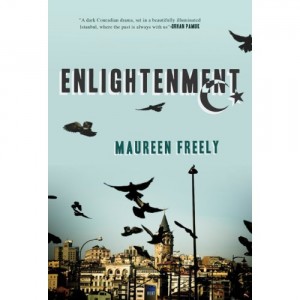 Near the middle of Maureen Freely’s Enlightenment, one character explains to another that in Turkey, “the first thing they make you do in a murder case is put you through a reenactment.” One of the book’s central storylines explores the supposed murder of a mentor of a group of leftist students in Istanbul in the early 1970s. And the novel itself functions as a reenactment, a piecing together of stories and perspectives. But Enlightenment is far more than a murder mystery: it’s about imperialism and politics and human rights, about love and memory, about the subjectivity of truth.
Near the middle of Maureen Freely’s Enlightenment, one character explains to another that in Turkey, “the first thing they make you do in a murder case is put you through a reenactment.” One of the book’s central storylines explores the supposed murder of a mentor of a group of leftist students in Istanbul in the early 1970s. And the novel itself functions as a reenactment, a piecing together of stories and perspectives. But Enlightenment is far more than a murder mystery: it’s about imperialism and politics and human rights, about love and memory, about the subjectivity of truth.
The main narrator, M, an American, left Istanbul in 1970, about the time Jeannie Wakefield arrived and fell in love with the same boy M had bid farewell. Years later, in the present action of the novel, Jeannie has come to M, asking her to help tell her story. She leaves her a fifty-three-page letter and access to her diaries, and then she disappears. It’s fitting that a novel whose themes are about secrets and perspectives uses the techniques of diary entries and interpreted stories to advance its narrative. What is simultaneously more truthful and subjective than a diary? Here, we not only miss what is untold because of lack of information but also what is untold based on self-preservation and self-creation.
Additionally, while some of the diary entries appear in their original form, there are vast swatches of text where M relates what happened based on Jeannie’s past entries and her present-day letter. The story, then, is filtered through yet another standpoint, once more removed. But while M is a journalist by trade, she is no objective bystander; she is herself emotionally connected to the story and its players. Surely memory is tainted by a yearning, a nostalgia, a desire to comprehend. Here, the personal and the political are enmeshed in an intricate history that does not disappear but instead reinvents and reasserts. When M considers the way the Jeannie stepped into her shoes, the way they share a history—not only a personal one but a history of American involvement in a foreign land—she says,
“You could . . . take this story back and back––back to the middle of the 19th century, if you were so minded. Only when you line up all these shoes in a row do you begin to get a sense of who we are, and what we signify.”
And just what do we signify? The narrator, early on, quotes the poet Derek Walcott: “Though the United States was an empire, it was invisible to most of its citizens.” What sorts of narratives are we constructing about ourselves as Americans, and what giant gaps are we omitting? How much of who we are remains invisible; or, how much do we simply choose not to see? Jeannie’s lack of complete cultural understanding and her naïveté raise important questions about ignorance: is it really a worthy excuse? Does it render us inculpable or rather make us all the more blameworthy?
As Americans in particular, we seem to have become happily ignorant of any sort of collective history and instead celebrate a self-absorbed individualism. In this age of the solipsistic narrative––we Twitter our whereabouts, we update our Facebook status to broadcast our actions and desires (we want Thai food, we’re having trouble concentrating, we are not wearing pants)––we have, ironically, removed ourselves from the present moment, not to mention the way we’ve separated ourselves from the past. Near the end of the novel, M says:
“For all the changes we had seen––the world felt more like 1970 with every passing day. The war in Iraq, and the war against the war . . . The isms. The atrocities. The invisible threat.”
Maureen Freely’s engaging, beautiful novel reminds us not only of the importance of history, but of its inextricability from our present-day narrative: a past never really buried but instead looming and palpable, a taste on your tongue, the acrid taste of ash.





